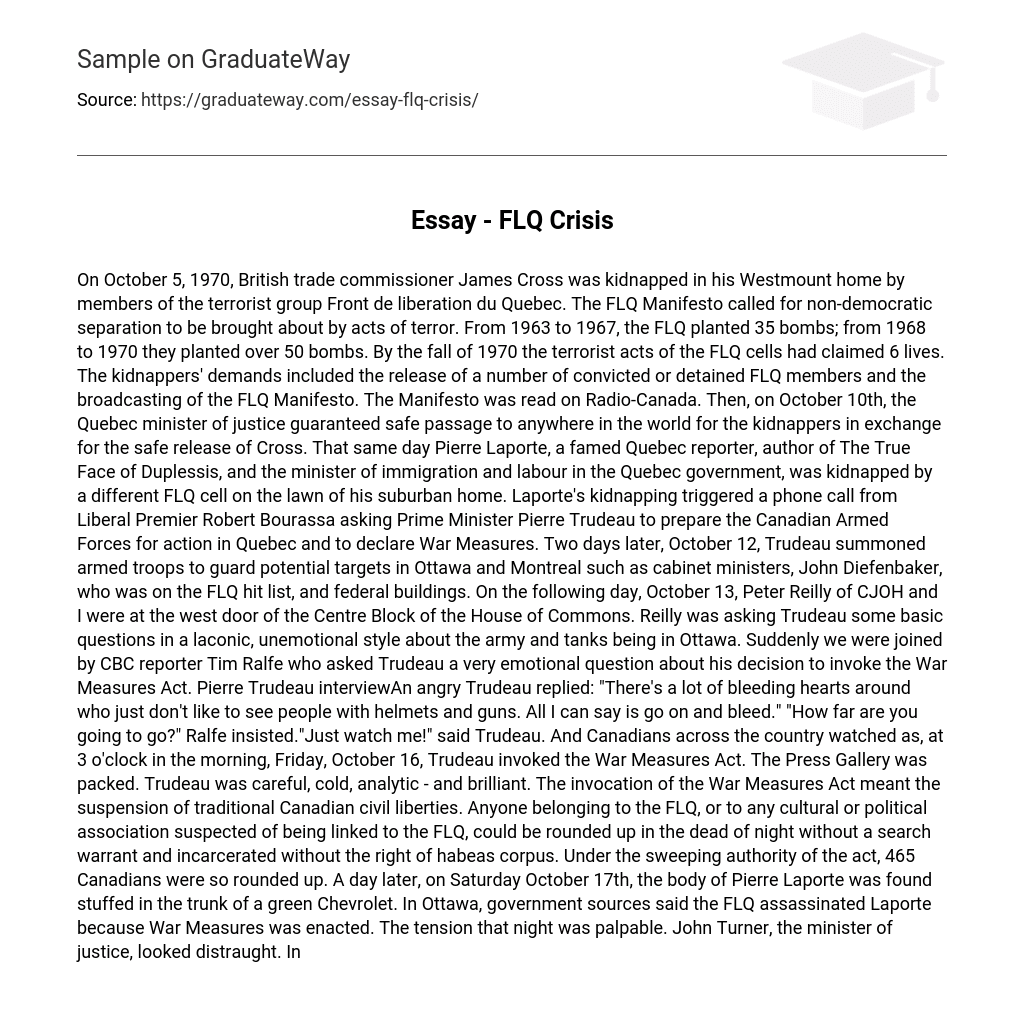British trade commissioner James Cross was kidnapped on October 5, 1970, in his Westmount home by members of the terrorist group Front de liberation du Quebec (FLQ). The FLQ Manifesto advocated for achieving non-democratic separation through acts of terror.
Between 1963 and 1967, the FLQ planted a total of 35 bombs, while from 1968 to 1970 they increased their bombings to over 50. By the fall of 1970, these terrorist acts resulted in the deaths of six individuals. The kidnappers’ demands included the liberation of several incarcerated or detained FLQ members and the public broadcasting of the FLQ Manifesto, which was later aired on Radio-Canada. Subsequently, on October 10th, the Minister of Justice for Quebec offered a guarantee of safe passage to any destination globally as an exchange for the safe release of Cross.
On the same day, Pierre Laporte, a well-known Quebec reporter, author of The True Face of Duplessis, and the minister of immigration and labour in the Quebec government, was abducted by a different FLQ cell while on his suburban home’s lawn. Laporte’s abduction prompted Liberal Premier Robert Bourassa to call Prime Minister Pierre Trudeau and request the Canadian Armed Forces’ readiness for action in Quebec and the declaration of War Measures. Two days later, on October 12, Trudeau ordered armed troops to protect potential targets in Ottawa and Montreal, including cabinet ministers, John Diefenbaker (who was targeted by the FLQ), and federal buildings.
On October 13, Peter Reilly of CJOH and I were at the west door of the Centre Block of the House of Commons. Reilly was asking Trudeau some straightforward questions about the presence of the army and tanks in Ottawa in his simple and unemotional manner. Soon after, CBC reporter Tim Ralfe joined us and directed an emotional question to Trudeau regarding his choice to activate the War Measures Act. In response, an angered Trudeau stated, “There are many compassionate individuals who simply dislike witnessing individuals with helmets and guns.”
All I can say is go on and bleed.” “How far are you going to go?” Ralfe insisted.”Just watch me!” said Trudeau. And Canadians across the country watched as, at 3 o’clock in the morning, Friday, October 16, Trudeau invoked the War Measures Act. The Press Gallery was packed. Trudeau was careful, cold, analytic – and brilliant.
The War Measures Act allowed for the suspension of civil liberties in Canada. Individuals associated with the FLQ or any related cultural or political group could be arrested without a search warrant and detained without habeas corpus rights. 465 Canadians were arrested under this act. The following day, on Saturday October 17th, Pierre Laporte’s body was discovered in the trunk of a green Chevrolet.
In Ottawa, government sources stated that the FLQ murdered Laporte because War Measures was put into effect. The tension on that night was clearly felt. John Turner, the minister of justice, appeared distraught. In his office, Trudeau ministers Gerard Pelletier and Jean Marchand openly wept over the loss of an old friend and colleague. In early December 1970, police located the kidnappers holding James Cross. He was released after his FLQ captors were granted safe passage to Cuba. Four weeks later, Paul Rose and the kidnappers of Pierre Laporte were discovered in a remote country basement. They were subsequently tried and found guilty of kidnapping and murder.
The October Crisis marked a significant moment in Canadian history, as it was the first time that extremists and terrorists held the state itself, both in Ottawa and Quebec City, hostage. In a drastic measure, Ottawa invoked War Measures, which had dangerous consequences. The atmosphere created by War Measures resulted in all separatist movements in Quebec being tainted by the terrorism and extremism of the separatist FLQ. However, Rene Levesque’s firm rejection of FLQ terrorism allowed Quebecers to consider democratic separatism as a viable option. Ultimately, both Trudeau and Levesque’s strong opposition to the FLQ led to the complete destruction of the organization.
By the end of the crisis, Quebecers and Canadians witnessed for the first time a federal government that was willing to take drastic actions and vigorously defend federalism in Canada. Returning to Canada in the 20th Century, the FLQ (Front de Liberation Quebecois) was a terrorist organization advocating for Quebec’s quick separation from Canada. Initially, the FLQ was a relatively small group, but its scale and influence were later called into question due to a series of bombings targeting government and English business establishments.
The government of Quebec and Montreal sought assistance from the Federal government after the abduction of two notable political figures, Pierre LaPorte, the Quebec Minister of Labour, and James Cross, The British Trade Commissioner to Canada, by the FLQ. Prime Minister Trudeau implemented the War Measures Act, a historic first during peacetime in Canada, without parliamentary consultation.
Three days after the parliament voted, the use of the War Measures Act (WMA) was approved. During its enforcement, the civil liberties of Canadian citizens were suspended. In some cities, officials utilized this act to improve the cleanliness of streets by apprehending and incarcerating “undesirable” individuals. Over 450 people in Quebec suspected of having ties to the Front de libération du Québec (FLQ) were imprisoned but eventually released without any charges being filed. Subsequent to implementing the WMA, no further abductions of public figures occurred in Canada.
Following the murder of Pierre Laporte by his captors, Cross was released without harm while his kidnappers were transported to Cuba as exiles. Nevertheless, this event sparked concerns among Quebec residents about the federal government’s response in the event of Quebec’s secession from Canada. The military presence on the streets and limitations placed on civil liberties left a negative impact on many individuals.





